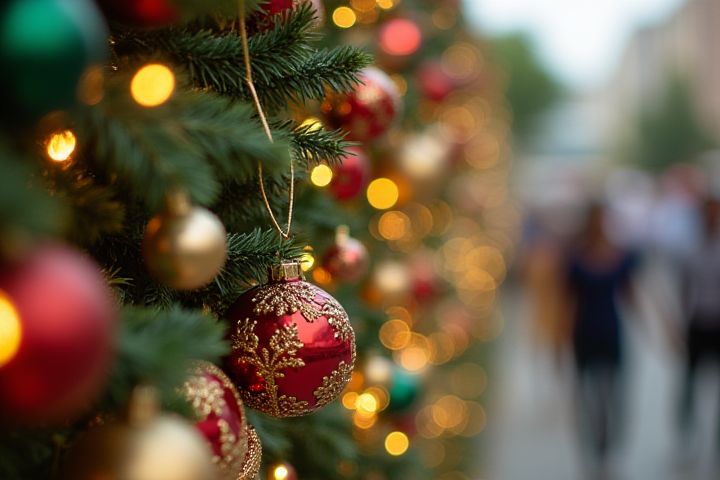
Public holidays in Nigeria reflect the country's diverse cultural and religious landscape. Major holidays include Independence Day on October 1st, commemorating Nigeria's sovereignty from colonial rule in 1960. The Islamic faith marks Eid el-Fitr and Eid el-Adha, while Christians celebrate Christmas on December 25th and Easter Sunday, varying each year. Workers' Day, observed on May 1st, honors labor contributions, promoting workers' rights and social justice. You can expect various local festivities and parades across states, providing a vibrant showcase of Nigerian heritage and community spirit during these significant days.
Independence Day
Independence Day in Nigeria is celebrated annually on October 1st, commemorating the nation's freedom from British colonial rule in 1960. This significant public holiday involves various events, including parades, cultural performances, and speeches that reflect Nigeria's rich heritage and unity. The day serves as a reminder of the country's journey towards self-governance and the ongoing quest for national development and peace. As you participate in festivities, you can appreciate the diverse cultures and ethnicities that contribute to Nigeria's vibrant national identity.
New Year's Day
New Year's Day, celebrated on January 1st, marks the beginning of the Gregorian calendar year in Nigeria. This public holiday is characterized by vibrant festivities, including fireworks, family gatherings, and various cultural events that reflect the diverse heritage of the nation. Many Nigerians take this opportunity to reflect on the past year while expressing hopes for the future, often accompanied by resolutions aimed at personal improvement. Your experience of this day can be enriched by participating in local festivities or enjoying traditional Nigerian dishes shared among family and friends.
Good Friday
Good Friday, a significant public holiday in Nigeria, commemorates the crucifixion of Jesus Christ, reflecting the nation's strong Christian heritage. Observed on the Friday before Easter Sunday, it typically involves various religious services, including solemn processions and prayers across churches. Many Nigerians take this time for personal reflection, engaging in family gatherings and traditional meals that foster community spirit. This holiday is part of a broader spectrum of public holidays in Nigeria, highlighting the country's cultural and religious diversity.
Easter Monday
Easter Monday is a significant public holiday in Nigeria, celebrated the day after Easter Sunday, marking the resurrection of Jesus Christ. It is a time when many Nigerians engage in various cultural festivities, family reunions, and religious observances. The holiday serves as an opportunity for individuals to reflect on their faith and spend quality time with loved ones, reinforcing familial bonds. Many local communities also organize events, including sports activities and fairs, enhancing social interaction and fostering a sense of unity among participants.
Workers' Day
Workers' Day, celebrated on May 1st, is a significant public holiday in Nigeria dedicated to honor the contributions of workers across various sectors. It highlights labor rights and promotes the welfare of employees, with numerous events and activities organized by trade unions and labor organizations. On this day, Nigerians participate in parades and rallies, advocating for improved working conditions and fair wages. Your involvement in these celebrations fosters a sense of solidarity and awareness about the labor movement in Nigeria.
Democracy Day
Democracy Day in Nigeria is observed on June 12, commemorating the country's return to democratic governance in 1999. This public holiday celebrates the importance of democracy and civic engagement, encouraging Nigerian citizens to reflect on their rights and responsibilities. Events such as parades, speeches, and cultural performances take place nationwide, promoting national unity and patriotism. By participating in these activities, you contribute to the ongoing dialogue about democracy and governance in Nigeria.
Eid al-Fitr
Eid al-Fitr is a significant public holiday in Nigeria, marking the end of Ramadan, the Islamic month of fasting. Celebrated by the Muslim populace, it involves prayers, feasting, and community gatherings, fostering a spirit of unity and generosity. Families often prepare special meals and share gifts with friends and neighbors, highlighting cultural traditions and philanthropy. In various regions, vibrant festivities include traditional dances, music, and colorful attire, making it a joyous occasion for all involved.
Eid al-Adha
Eid al-Adha is one of the significant public holidays in Nigeria, celebrated by the Muslim population across the nation. This festival, also known as the "Festival of Sacrifice," commemorates the willingness of Prophet Ibrahim to sacrifice his son as an act of obedience to God. During Eid al-Adha, families engage in communal prayers, share meals, and perform the ritual sacrifice of livestock, distributing the meat to those in need. The observance fosters a sense of community and charity, reflecting the core values of compassion and generosity in Islamic culture.
Christmas Day
Christmas Day is one of the most significant public holidays in Nigeria, celebrated on December 25th each year. During this festive occasion, families gather for traditional meals, church services, and gift exchanges, reflecting the country's diverse cultural backgrounds. Events often include vibrant parades, music, and dance, showcasing Nigeria's rich heritage. In addition to Christmas, other public holidays such as Boxing Day and New Year's Day also contribute to the holiday season, enhancing the spirit of community and togetherness.
Boxing Day
Boxing Day, celebrated on December 26th, is one of the prominent public holidays in Nigeria, reflecting the country's rich cultural diversity. During this day, families and friends come together to exchange gifts, share festive meals, and engage in various leisure activities, fostering a sense of community and togetherness. Major cities like Lagos and Abuja see vibrant street celebrations, with events that include concerts, sporting activities, and social gatherings that attract both locals and tourists. Understanding the significance of this holiday can enhance your appreciation of Nigeria's cultural heritage and strengthen social bonds within Nigerian communities.
